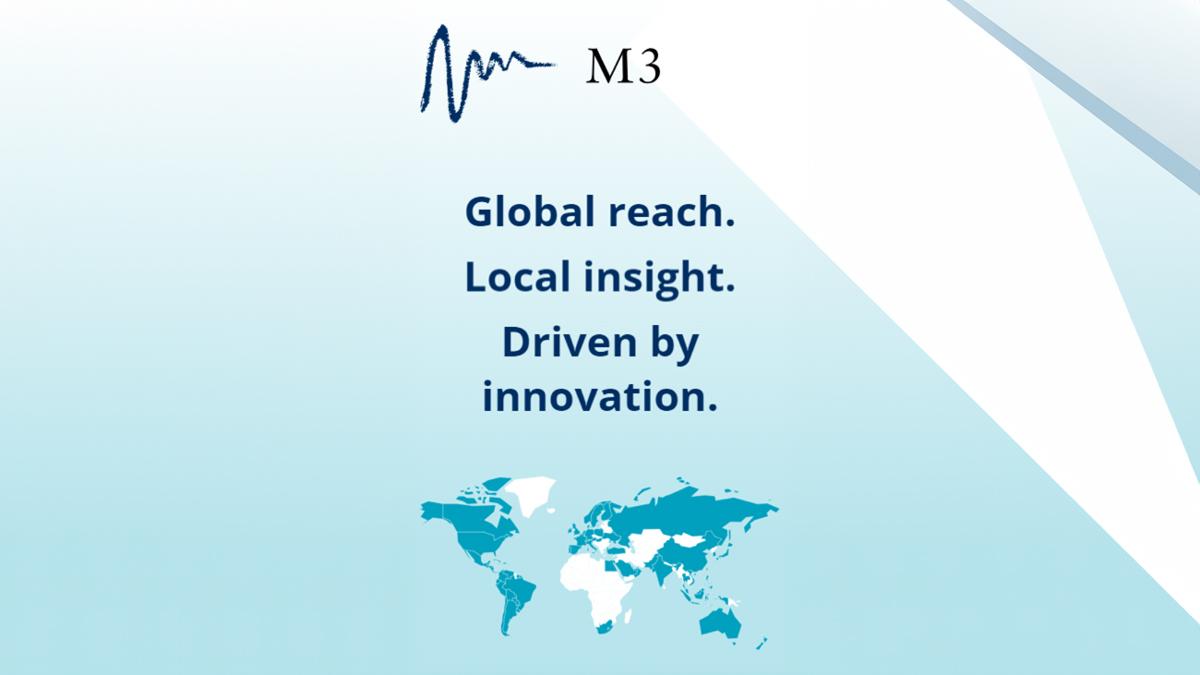Localisation: Tailoring global campaigns for local success

When it comes to the pharmaceutical industry, a company’s marketing or educational efforts require not just a stellar set of global plans and materials, but also the ability to adapt global approaches for optimised reception by healthcare professionals (HCPs) in a specific market. Recently, pharmaphorum spoke to M3 EU’s Executive Vice President, Tim Russell, and Senior Vice President, Dr Maxim Polyakov, about why it’s important to localise campaigns, how this can be done effectively, and what the benefits are.
One size does not fit all
M3 EU delivers centrally managed marketing communications campaigns, adapting them to work at the local level. To achieve this, campaigns are customised, translated, and disseminated to doctors in each target market, allowing global clients to engage with doctors of all specialties meaningfully and measurably.
Russell’s own journey took him from pharmaceutical representative, progressing through domestic marketing roles in the UK, to senior marketing leadership in the European domain. The learnings from that time translate well to his current position.
“M3 has six million clinicians worldwide on its networks, but if you think about the huge difference in cultures and healthcare systems between countries, it is clear that one size does not fit all,” Russell explained. “You can't simply take a global strategy and its associated content, and send it out globally without any alterations. That doesn't work. If you want clinicians to read your content, it has to be made relevant to their local clinical practice. At M3, we pride ourselves on doing just that – and getting great engagement as a result.”
Meaningful engagement
Such optimisation would include translation into the local language, but could also include tailoring of the content to take account of the local guidelines. And when it comes to video content, it could mean utilising a clinician from the target market, so that the message really resonates.
“M3 is very much about quality of engagement,” Russell said. “It is not just about how many doctors you engage: reach has to be combined with depth of engagement. M3 is able to deliver that because the information that it shares with HCPs is deeply meaningful in their context.”
For Polyakov, who leads the market research team, charting the path to ‘deep and meaningful engagement’ is a key part of how his team supports pharmaceutical campaigns. By way of example, he referred to recent M3-sponsored research on migraine treatment, which showed a number of significant differences in clinician behaviour between geographies.
“We surveyed neurologists in the UK and Germany. UK neurologists reported prescribing a drug class called CGRP monoclonals to only 2% of their patients,” he continued. “In Germany, however, that number was 22%. So, if you are a company marketing these drugs, you may need a different approach in each market. I’m not trying to suggest that all neurologists in the UK should be communicated with in the same way, and ditto for Germany: tailoring and optimisation of comms should operate at multiple levels. But getting market-specific and specialty-specific insights is a great start and can go a long way towards ensuring that, when pharma do commit their precious marketing budgets to a campaign, it is set up to succeed.”
Bringing behaviour change into effect
When it comes to ensuring that a campaign possesses a depth of engagement necessary for meaningful absorption by an HCP, the M3 philosophy is data-driven, and focused on continuous improvement.
“A simple count of impressions or page visits is a surrogate marker of success,” Russell propounded. “Measuring the time spent on a page or the extent of interactive engagement (e.g. for how long a video was viewed, or engagement with polls) are better indicators of a deeper engagement with the content. However, this doesn’t measure a campaign’s impact, i.e. the extent to which a campaign influenced someone’s knowledge, beliefs, and intentions. To close this gap, we leverage our market research capabilities: we run primary research with doctors both before and after a campaign and measure the difference. This also gives us ideas for how to improve the next set of campaign content.”
Russell continued: “Our clients want to know how their customers’ behaviour has changed as a result of looking at that content. By using market research to underpin this, we are able to show that we have indeed moved the needle on awareness of the brand, or confidence in treating a condition. And it’s also very satisfying to find out that we helped HCPs become more confident and knowledgeable, as this translates directly into better patient care.”
Polyakov agreed: “It’s not the process that matters, it’s the outcome, making a positive impact.”
Beyond Europe: Localisation on a global scale
M3’s know-how comes from operating on a truly global scale.
“M3 is a Japanese-owned company with a huge presence not only in Europe and the US, but also in Asia, most notably Japan, China, South Korea, and a large, developing presence in India,” Russell expanded. “We have local experts in all of these markets, which allows us to bring local insight to our work. But, beyond this, it also means that our teams can work smoothly with local affiliates.”
Russell continued: “This can be very helpful in dealing with a common issue we often encounter when global campaigns are passed down to the local markets – getting local market buy-in. In fact, one of our first questions to a global or regional leader is: ‘Do you have agreement from the markets?’ If they haven’t, we can happily support that part of the process, too; by providing the right tools to ‘sell in’ the campaign, or facilitating the right conversations.”
Customised campaigns for local markets
It goes without saying that the world is a big place, with multitudinous differences, and requiring flexibility and adaptive approaches. This complexity is a challenge for any industry, but one which M3 is well-placed to manage.
“We fully understand that principle,” Russell said. “We work in close partnership with our clients to ensure that their campaigns are optimised by market and are a great success in whatever part of the world they are run.”
And for Polyakov? In short, “Global success is made up of success in local markets.”
As a conclusion, it is both pithy and pertinent. M3 is a global company, but driven by local expertise that enables it to reflect the nuances and priorities of each market in which it operates. This nuance is the very heart of localisation, and M3 captures it very well indeed.
About the interviewees

Tim Russell is Executive Vice President at M3 and an experienced international marketer. He has spent over 20 years in the pharmaceutical industry. Russell is passionate about building M3’s strategy and using data insights to maximise results for clients. He specialises in delivering compelling solutions to meet pharmaceutical commercial objectives and offer clear and tangible value.
 Dr Maxim Polyakov is Senior Vice President within M3’s business intelligence and research division. He is passionate about helping companies unlock their full potential by using data and insights to make better decisions, as well as ensuring that the voice of patients and HCPs remains at the centre of healthcare systems.
Dr Maxim Polyakov is Senior Vice President within M3’s business intelligence and research division. He is passionate about helping companies unlock their full potential by using data and insights to make better decisions, as well as ensuring that the voice of patients and HCPs remains at the centre of healthcare systems.













